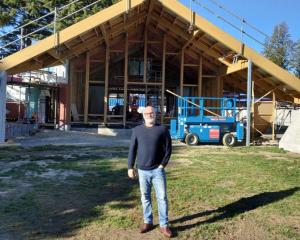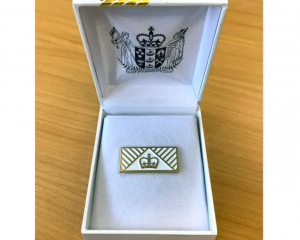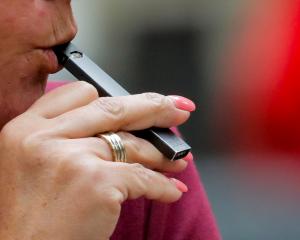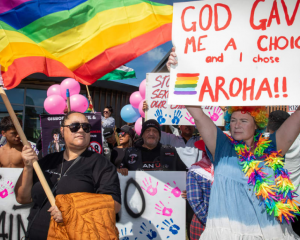The decision to drop charges against former Pike River Coal boss Peter Whittall would not have been taken ''lightly'', a University of Otago law professor says.
Prof Kevin Dawkins said it was ''unhelpful'' to characterise a $3.41 million payout to the families and survivors of the 2010 disaster which killed 29 men as ''blood money''.
His comments come after family members of the dead men, opposition MPs and unions yesterday decried the decision to drop charges.
In the Christchurch District Court yesterday, the Crown said that after an extensive review, it was ''not appropriate to continue with the prosecution against Mr Whittall''.
Instead, Whittall and Pike River Coal offered a voluntary payment on behalf of the directors and officers of the company to the families of the men and two survivors.
Judge Jane Farish made it clear the surprise turn of events was not a case of a chief executive ''buying his way out of a prosecution''.
She told the court the likelihood of a successful prosecution was ''extremely low'' and the case might never have reached trial.
The charges were laid by the Ministry of Business Innovation and Employment (MBIE) under the Health and Safety in Employment Act.
Prof Dawkins said he believed the Crown was faced with a ''difficult choice'' and its final decision was a ''pragmatic'' one, made in ''good faith''.''
You have to weigh two principal factors. There is the public interest, which probably overwhelmingly pointed towards prosecution, and then there was the sufficiency of evidence.''
If the decision is made that even though the public interest is predominant there would be insufficient evidence to sustain a conviction then [going to trial is] a futile exercise,'' he said.
The fact many of the 92 witnesses were not willing to give evidence, and the likelihood the trial would descend into a ''technical exchanges between experts'' could have made convicting Whittall a difficult prospect.''
The alternative scenario would be that [if] the Crown proceeded, it might have got some convictions, it may have got none, in which case he wouldn't have been liable to any sentence, including a fine,'' he said.
If this was the outcome, the victims' families would have been ''equally as baffled and disappointed as the decision taken today - perhaps even more so''.''
I suppose families wanted their day in court, which is completely understandable, but I think it's unhelpful really to describe the culmination of this case as the payment of blood money,'' Prof Dawkins said.
Paying compensation meant that ''in a sense'' Whittall and the directors of the company had ''been held to account''.
The fact Whittall had been discharged - rather than the evidence being withdrawn - meant Whittall could not be charged again, he said.
Four former heads of Pike River Coal, including Whittall, said in a statement yesterday the money that would have been spent defending the case would now go to the families.
It meant $110,000 would be given to each of the families and survivors - totalling $3.41 million. The directors - Whittall, John Dow, Ray Meyer and Stuart Nattrass - have also offered to meet the families.
Bernie Monk, spokesman for most of the families, vowed the families ''won't let this lie''.
''We're going to take this further ... What really frustrates me is that some of those mining guys who worked with our men underground wouldn't come back to testify.
"And it's just gut-wrenching to hear that today.''
Mr Monk said he would ''never'' meet Whittall.
Anna Osborne, whose husband Milton died in the disaster, said she was ''sick to the stomach''.
''There is no justice or accountability for the Pike 29,'' she said.
''As far as I'm concerned, it's blood money.''
Neville Rockhouse, whose youngest son, Ben (21), died in the tragedy, called on the Government to rethink introducing corporate manslaughter.
''Corporates can pretty much do what they please - that's the message that comes out of this sorry, terrible tragedy.''
Carol Rose, whose son Stuart Mudge died in the mine, said it was never about money for the families.
''It's about justice. It's about 29 men going to their workplace and never coming home. They were killed; they didn't die.
"It wasn't an accident. They were killed, and no-one is being held accountable.''
EPMU assistant national secretary Ged O'Connell said he was ''stunned into silence'' when he heard the decision.
''It's an appalling indictment on the health and safety culture of New Zealand.''
MBIE counsel Mark Zarifeh said one of the major problems was ''witness availability''.
Of the 92 witnesses who had given a brief of evidence, 31 had not been signed ''for one reason or another''.
Of those, 14 witnesses are outside New Zealand - living mainly in Australia - and Crown lawyers had no powers to summons witnesses living overseas.
Whittall's lawyer, Stacey Shortall, said his offer to meet the families of the 29 victims was ''real, genuine [and] heartfelt''.
Mr Whittall had made the offer in good faith, although she said she realised there had been hostility to the idea by some families yesterday.
Out of respect for the families, Whittall would not be giving any interviews or releasing any public comments about his reaction to the case being dropped, she said. -
Additional reporting from The Greymouth Star












